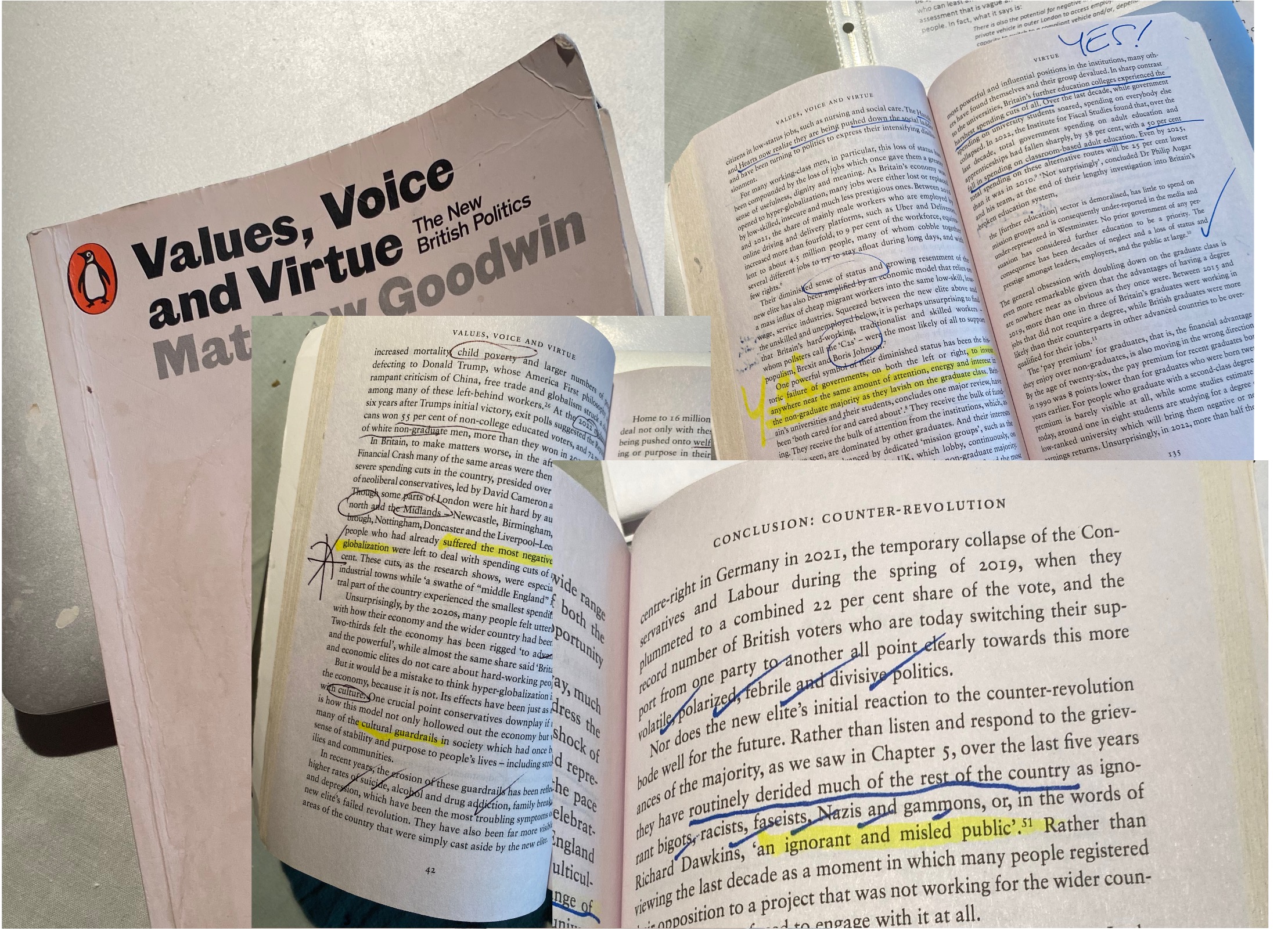This is Blog No 27
This is a Book Review.
Matthew Goodwin is Professor Politics at the University of Kent and his latest book – Values, Voice and Virtue is deeply controversial.

Few of us have found the time to read it and may be deterred by the hostile reception it has received from fellow-academics and political commentators.
Yet I think it needs to be taken seriously because it raises important issues and has many lessons and implications for public engagement and consultation.
His central argument is that in the UK, there is a growing rift between a minority ‘elite’ of graduates holding liberal attitudes towards globalisation, immigration, and progressive cultural/identity values - and those older or working class citizens who hold more traditional views. This is his explanation for the re-alignment of our politics and explains the popularity of Nigel Farage, Boris Johnson and other right-wing leaders and the willingness of the non-elite majority to vote for BREXIT.
He produces a barrage of statistical support for this, though reviewers have cast doubt on many of his sources of information. Personally, I have no problem with his general thesis that as people become educated, they also become more liberal in outlook, and politically, have ‘moved to the left’ whereas those who have been ‘left behind’, often victims of de-industrialisation and holding more traditional values have ‘moved to the right’. He cites the collapse of the Labour Party’s red wall seats as proof that there has been a seismic, (and he says, permanent) shift in the electorate’s views and behaviour. Almost certainly, as recent events are suggesting, he has over-interpreted the 2019 General Election, discounting the charisma of Johnson, the disarray of Labour and the continuing impact of the tabloid propagandists.
In more detail,
- Some of his analysis is well founded and well researched. Yes, communities DO reflect serious differences of approach on matters such as immigration, diversity, gender politics, free speech, pride in British history and other socio-cultural issues. And it is right to seek to understand them.
- He is very good in describing how the EU, and the British ignorance of how it worked, led many to believe that huge parts of the political agenda had become a no-go area for domestic influence – leading to a feeling of powerlessness.
- He is also good in chronicling the drift of Parliament away from being reflective of society at large and becoming the preserve of a largely professional political careerist culture.
- A major theme – to which he returns page-after-page - is that the elite not only thinks it knows best but looks down on the majority as being stupid, racist, and morally inferior!
- Goodwin is hopeless at even pretending to be objective. He talks of the liberal elite disdainfully as if every individual suffers from an unmentionable dread disease and, collectively, hell-bent on humiliating those without a degree! No doubt he enjoys poking his critics in the eye.
For those who want to know more about these divisions in society, there is much else in this book. Just don’t expect to discover what different groups think of our public services, the NHS, the housing shortage, climate change, tax breaks for rich people etc. He hardly mentions them!
For all its manifest shortcomings, I find his overall analysis about the divisions in society sufficiently compelling to warrant reflecting on some of the lessons for public engagement and dialogue. There are rather a lot of them, and I will publish more soon, but for now, here are six points worth consideration:
- Values, Voice and Virtue, if it does nothing else, illustrates the huge variation in citizens’ attitudes, the factors that lie behind them, and that many of them feel excluded from any form of political or community decision-making. This alienates them and should make us all reflect whether we do enough to seek them out and listen to them.
- It should therefore reinforce our commitment to the principle of Seldom-heard. Fifteen years ago, the language used was ‘hard to reach’, but today, many of those who Goodwin rightly identifies as lacking sufficient voice, are easy to find, for they are – in his terms a disenfranchised majority.
- We should perhaps readjust our Seldom-heard programmes. These have been rightly focused on many of the ‘equalities’ groups, and attention and budgets have certainly gone into engaging with ethnic groups, faith groups, disability and other important categories. We may need to look closer at disadvantaged socio-economic groups.
- It maybe time also to revise our Stakeholder mapping. Goodwin identifies many in the bottom-right part of the classic Influence/Interest matrix. How many, I wonder are there right now?
- The analysis begs some interesting questions of new more deliberative engagement techniques. If you devise a proportionally representative audience to participate in a Citizens’ Assembly, what is the likelihood that as they are ‘educated’ on complex issues like climate change or electoral reform, those from Goodwin’s ‘traditionalist’ majority become more liberal, and desert the very characteristics that led to their selection in the first place?
- Finally, for those of us steeped in the Art and the Politics of consultation – we need to recognise that it often has and continues to be an elitist form of engagement – at worst, the elite engaging with the elite! For some issues and in some contexts, this is defensible – but not often. It need not be like this, and it is good to see more participative and inclusive methods of involvement emerging. Substance no doubt, for many further books and blogs!
In summary, it can sometimes take a bad book to prompt us into good thinking.
I recommend the book as an interesting read, but not for those prone to raised blood-pressure.
See Rhion's Speeches, Talks and Presentations
For More like this - free of charge: SUBSCRIBE now
Leave a Comment
I hope you enjoyed this post. If you would like to, please leave a comment below.